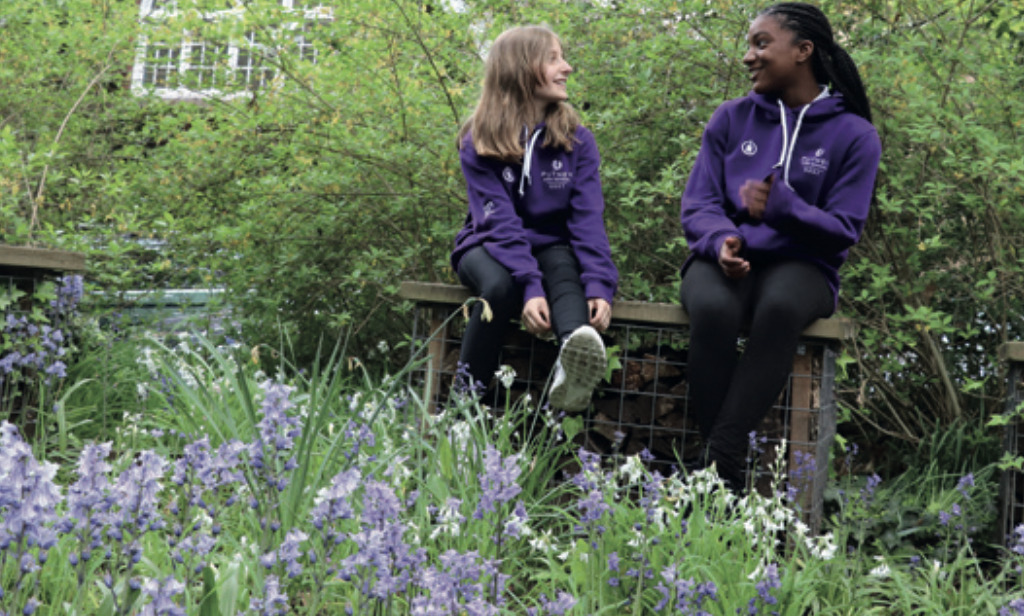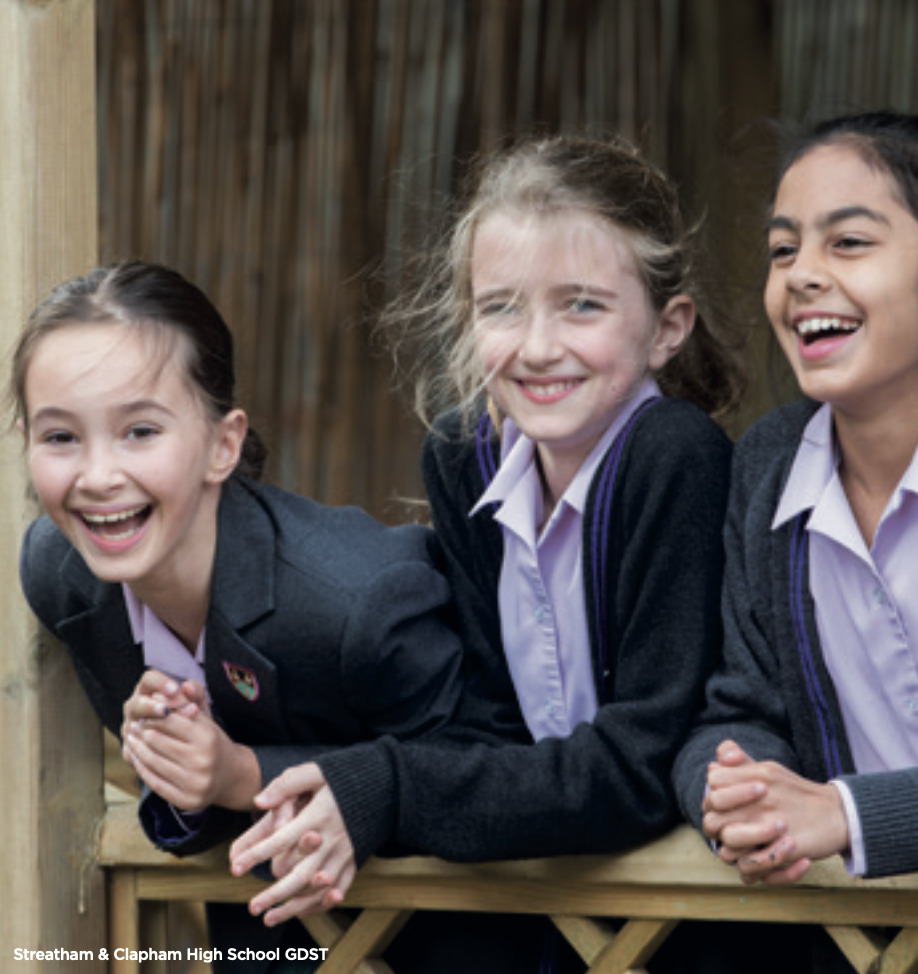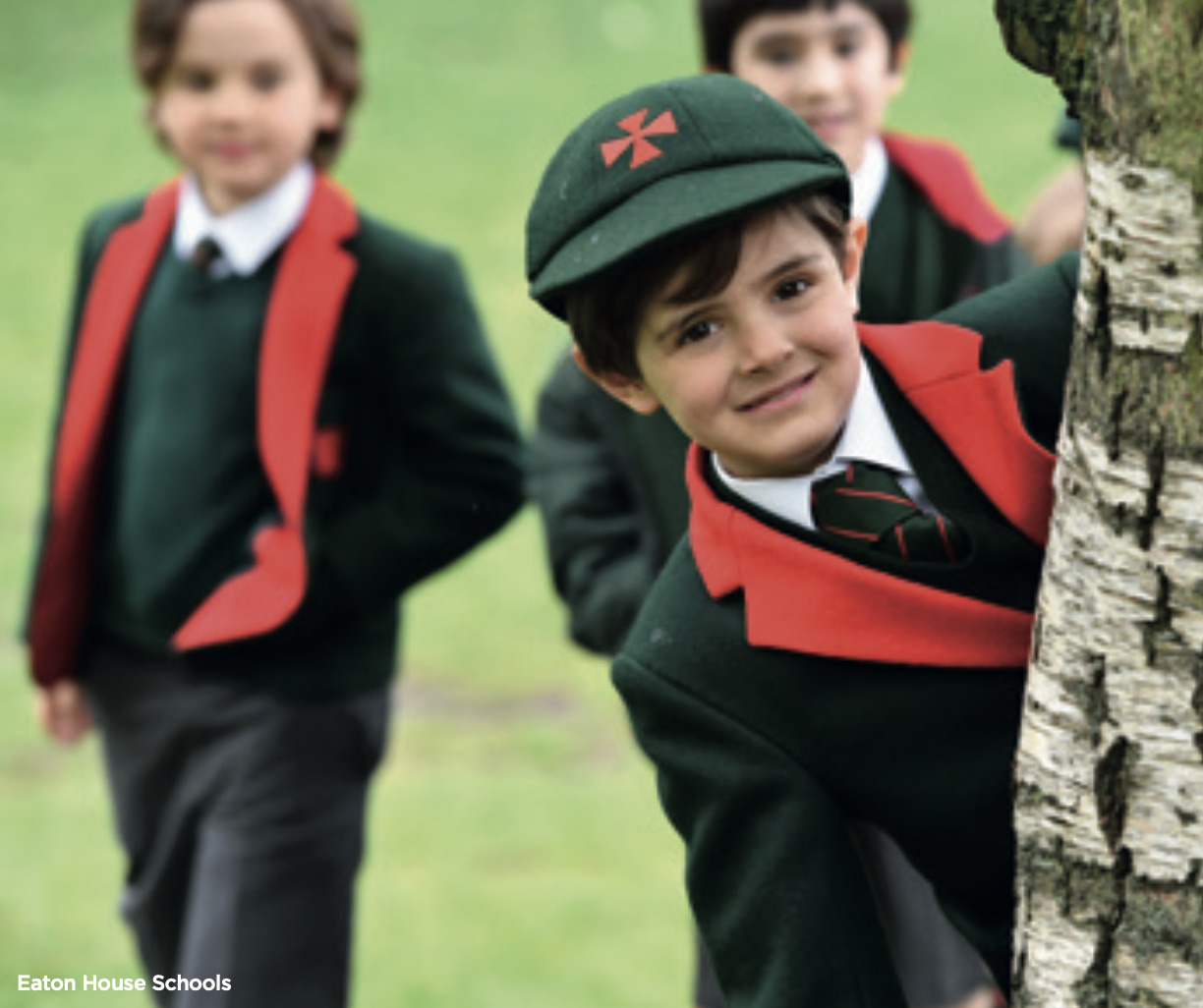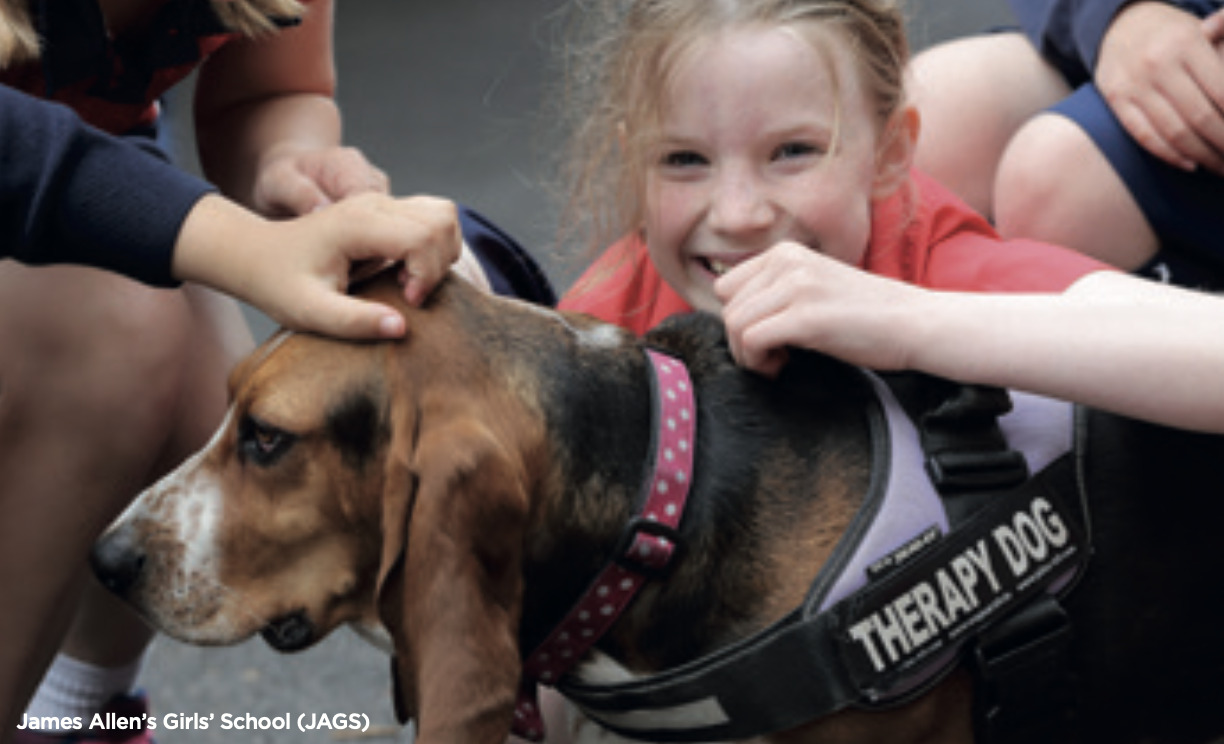Menu
Covid threw up so many concerns over the last 15 months, none more so than children’s mental wellbeing. The Good Childhood report from The Children’s Society highlights that children’s happiness can be tied into how they feel about school and friendships. Last year’s multiple lockdowns triggered isolation from those vital friendship groups and it’s no surprise that we’re seeing an explosion in children’s mental health and wellbeing.
Schools report an increase in anxiety levels, self-harm, eating disorders, a lack of concentration and engagement in lessons which will impact attainment, and the need to re-socialise children with groups. Children may have been in touch digitally but that’s not the same as being in a school together. James Allen’s Girls’ School (JAGS) acted and made short films about going round the campus in readiness for their return to school.
Wellbeing issues are manifesting themselves more in secondary provision rather than in primary, and across both the state and independent sector. But some practitioners see younger age-groups equally affected. “Impact is felt across all age-groups. From experience (and parental and school feedback), children in pre-school and Key Stage 1 have (developmentally) regressed in their social and inter-personal skills and that’s where emphasis will need to lie initially,” says Dr Josephine Storek, consultant neurodevelopmental psychologist.
Juliet Richards, co-founder of The Parent Team, agrees. Her company works with parents of nursery, primary and early secondary school age, and children’s wellbeing is a key topic in their courses. “We’ve had questions from parents about helping their children re-establish friendships, re-balance digital use, and how to manage increased anxiety levels and emotional outbursts,” she says.

HANDLING EMOTIONAL OUTBURSTS
Children get upset easily and strong emotions overwhelm them leading to challenging behaviour. It’s due to the immaturity of their developing brain. Until their mid-20s, their emotional centre dominates over logical parts of the brain. How we respond to outbursts affects our child’s ability to calm down, develop emotional awareness and self-regulation.
It’s tempting to reassure or distract and prioritise changing behaviour above making an emotional connection. But helping children develop ‘Emotional Intelligence’ is one of the most important things we can do. Our children’s ability to recognise and manage feelings makes a fundamental difference to their behaviour, relationships and learning capacity. We recommend an approach called Emotion Coaching which involves staying calm ourselves, identifying and describing how our child may be feeling, and using that emotional connection to help them self-soothe and re-direct their actions.
Source: The Parent Team
“We’re asked about how best to respond to emotional outbursts all the time by parents with kids of all ages. They want to know how to respond to a child who literally can’t listen because they’re so upset, whether they’re acting out or withdrawing. These situations can easily escalate, whether the child is upset about not getting an ice-cream, not wanting to do homework, or something their sibling or a friend or a teacher said to them, and leave parents feeling upset and frustrated too.”
Schools believe that these issues are only the beginning of much longer-term concerns. “We have to accept that there will be issues. Some children need to adjust and some may need counselling support,” says Sam Payne, Senior Designated Lead for Mental Health at JAGS. “All they want to do is mix in year groups across the school.”
Paula Kearney, Head of Wellbeing at Eaton House The Manor, also believes it will be a long haul. “It’s naïve to think [the lockdowns] won’t have a long-term impact. We won’t know for a number of years how this plays out. A year is a huge portion of their lives but also don’t underestimate how robust children are and how they bounce back. We need to prepare them for better.”
All is not doom and gloom. Simon Severino, Head of the Junior School at Alleyn’s, paints a more optimistic picture. “Some kids have become stronger, more independent, more responsible and with better IT skills, but we recognise that for some kids it was really tough, particularly if you have no siblings.”
Severino points to the lockdown period where children controlled their world, their computer and their resources, and the shock of coming back to school and having to share again.
The Parent Team’s Richards advises to reach out for help. “I think we will see behavioural and emotional issues emerging over the next year or so, for children of all ages. The important thing for parents to know is that there is a lot they can do to develop their child’s confidence and emotional resilience, and there is support available to do this. Rather than worry alone, they can ask for help.”
Concerns over mental wellbeing were already on the rise pre-Covid. The Children’s Society tracks children’s wellbeing in the UK between the ages of 10-17 and their statistics show that it was on a downward trajectory up to the pandemic.
“Over the past decade children have reported less satisfaction with school, specifically school culture with areas such as sexism, racism, even school uniforms. They say it feels like a prison and that no-one listens to them,” says Richard Crellin, the society’s Policy & Research Director. “They spend five hours a day there so it’s important to get it right.”
The ChiIdren’s Society has been calling for a balance between academic catch-up and children’s wellbeing. “They work in harmony not against one another. A happy child is ready to learn but if a child is worried about an eating disorder or abuse at home they won’t perform. If we can take one thing from this pandemic it’s that keeping the child happy is key.”
Alleyn’s Severino agrees. “The key thing is not necessarily academic catch-up but social catch-up. Children need those interactions and the ability to play.” Keeping children in year group bubbles means missing out on cross-year groups, such as older year groups mentoring younger ones.
The pandemic coincided with new government guidelines on RSE (Relationships and Sex Education), revised for the first time in twenty years, so long overdue. Before schools re-opened this spring, they had to absorb these statutory changes which impacted on pastoral care provision and teacher training, and readied themselves to deal head-on with a wide range of support pupils would need to shore up their confidence, resilience, stress levels, emotional intelligence and general self-confidence.
Schools must ensure that they have the mechanisms in place, which is essentially a robust pastoral care programme, a trusted adult who children can talk to and a general school culture of feeling free to share what’s going on.
“In primary school that might be a TA or wherever that trusted bond is and in secondary it’s the likes of form groups and year groups,” says Steve Barker, Head of Governance Services at support services provider Strictly Education 4S. “There have to be barriers and boundaries so it’s about starting them young.”
Sufficient provision to listen to children is at the heart of the issue. “When a child feels valued and listened to their self-esteem rises and the results that they achieve are the best that they can be,” asserts Matthew Pickard, Head at Eveline Day School.
Finton House models and promotes kindness in everything they do. “We also believe in the importance of being kind to oneself. As such, pupils can attend lunchtime mindfulness sessions and are given mentors to help them to develop this relationship with themselves as well as others,” says Head Ben Freeman.
In most schools these ‘touch points’ will be the TAs, school nurse and/or counsellor, tutors – the personal champions for both pastoral and academic matters – and
for some the sports coach. Typical is Broomwood Hall Upper School with its Listening Lady, aka the school counsellor, who works with girls on an on-going basis to help them with whatever troubles them.
Alleyn’s Junior School made it plain what all the ‘touch points’ were for children as well as reminding staff about their duty to children. “Supporting children is a team effort and our tutors and senior staff work closely with parents to keep our girls feeling that they are loved and that there are people who value them,” says Will Morris, Senior Master, Broomwood Hall Upper School.

STRONG WELLBEING
It has been well documented that anxiety and wellbeing concerns have increased during the pandemic. Young people and teenagers are no exception. Strong mental wellbeing can help teens flourish in life, supporting them with the challenges of the teenage years and providing skills and strategies that they can use throughout their lives.
Here are five simple actions that a family can apply for a positive effect on your collective wellbeing:• Connect with people
• Be active
• Appreciate the small things; practise gratitude
• Learn new skills or be creative
• Give backOur students benefit from coaching and mentoring timetabled as part of the curriculum and individual counselling is also offered to all. This approach helps students thrive mentally, emotionally, physically, and academically.
Source: Portland Place School
He believes that how well an individual child coped with lockdown started with what their resilience and emotional security was like before the pandemic. “Attachment Theory advocates would suggest that the child’s emotional wellbeing was to a large degree set by the time they were very young children.”
This subject is being explored fully in The Big Ask, a post-Covid government survey of children and young people aged 4-17 across England. The results will inform government of what children need to live happier lives. Questions will drill down to what children want in the future and what is holding them back.
“This is the largest ever survey of children and young people in England,” says Rachel de Souza, the Children’s Commissioner for England. “My job is to speak up for children in England, stand up for their rights, and make sure that the people in power listen to what children need and want.”
It’s a pivotal time for school children as in tandem with the Big Ask is the Ofsted review into an issue far darker: sexual abuse and harassment in schools. As a result,
the NSPCC has been commissioned by the Department for Education to set up an independent helpline for children, parents and professionals to seek expert, sensitive advice from the NSPCC and safely report abuse that has happened or is happening in educational settings.
Some 16,000+ anonymous testimonies of survivors of abuse at schools, colleges and top universities shared on the Everyone’s Invited website since its launch in June 2020 has prompted not only outrage but a quick response from many quarters. Most schools audited their communications with children and parents, all schools reviewed their PHSE teaching. Many of the issues are political matters and are tackled in current affairs classes.
The movement has opened debate on broader issues of gender equality, LGBTQ, Black Lives Matter and the attitudes, behaviours and beliefs in society which some say normalise and trivialise sexual violence and discrimination. Casual sexism, misogyny, the notion of consent and how to maintain respectful sexual relationships have all come under the spotlight and schools have been quick to strengthen their PHSE provision.
Schools are busy having meaningful conversations with students, alumni and parents as they look at what further actions they can take to address all these issues. “Some have already announced they are commissioning external, independent reviews in a range of areas including policies, procedures, training and curriculum, and are also revisiting their peer-on-peer abuse procedures to ensure they provide best possible outcomes for the school community and that pupils know how to report, so they can be supported and action taken,” says Julie Robinson, Chief Executive of The Independent Schools Council (ISC).
Moreover, schools are sharing best practice in relation to delivering relationships and sex education and health and wellbeing initiatives. Putney’s Longstaff says that they are constantly reviewing processes and that the Everyone’s Invited campaign highlighted the importance of their pastoral programme. “It has allowed us an opportunity to talk about it more,” she says.
JAGS has appointed gender equity and respect prefects to ensure the girls will be listened to. “Gender equality needs to be embedded in school life. We need to model good relationships and good behaviour,” says Alleyn’s Severino. “Sometimes we are explicit but children learn most by what they see in front of them and it becomes normalised.”
The most powerful counter argument to racism is seeing different races in schools. Schools’ drive for inclusion and diversity is helping but Severino says that more can be done to diversify the staff body. “It could be better,” he says. “It’s critical to have that so children can see themselves reflected.”

WELLBEING IN SCHOOLS
With a growing mental health crisis among teenagers, primary schools need to take a greater responsibility for teaching children how to lead a healthy life in its broadest sense; ensuring that they stay mentally, as well as physically, fit. All children should learn how to articulate their emotions early on so that any stigma surrounding mental health is removed.
We do this by teaching the ‘Zones of Regulation’ where four different colours correlate to four emotional states, encouraging the children to connect with their emotions whilst also gaining an understanding of how their peers are feeling. Mindfulness is incorporated into our assemblies and it is taught as part of the PSHEE curriculum, with Mentoring groups for older children. All pupils can spend time with visiting therapy dogs (and pigs!) which help them to relax and talk openly about their feelings.
Source: Finton House School
Perhaps most shocking of all was the inference that school pupils didn’t feel they could say anything about what was going on. Fingers have been pointed at government and at schools for failing to educate pupils and students appropriately despite much of the offensive activity being played out on chat forums and social media platforms.
“Schools are not the only factor in all of this,” says Steve Barker. “Change has to come from home and society. Schools cannot be the scapegoat.” Barker was concerned a few years ago when the sexting scandal broke as teenagers didn’t see anything wrong with receiving and sending such messages. “It highlights the systemic weaknesses in our society,” he says.
Relationship and Sex Education (RSE) is taught on an age-appropriate basis so areas such as sexual consent and party culture for example, will only begin in Sixth Form. “There is a huge national problem, and we have a lot of work to do to resolve it,” says Jane Lunnon, new Head at co-educational Alleyn’s. “Most schools, my own included, have been teaching sex education, consent and mutual respect through PSCHE for years, and we are now reviewing that programme and ensuring we support parents as well as pupils in the future.
However, it is clear to see that an immense and nationwide effort is needed to ensure the right messages land properly and effectively. “Critically, boys and young men need to
be part of the conversation and part of the solution. A gender war helps no-one, and pitting girls against boys or ‘othering’ the opposite gender, is no solution. Our young people must learn how to tackle these things head on; how to listen to each other generously and with respect, and how to express their concerns and their hopes openly together.”
Lunnon stresses that it is not a question of protecting your daughter and educating your son. The message of gender equality and mutual respect should involve every male and female pupil in the school. Alleyn’s pupils, parents, staff and alumni are drawing up an Equality Charter.
Schools run age-appropriate RSE but it’s questionable whether teachers have the ability to know how to respond to a child if they are told something sensitive.
All-girls school Putney High, for example, relies partly on outside provider the School of Sexuality Education with their team of “unembarassable facilitators”, for pupil workshops on sex education and a safe place for them to talk and ask questions of a non- judgmental specialist.
“It’s helping children to grow up in a modern world, to navigate their way,“ says Head Suzie Longstaff. The school also has its version of a secret postbox, where the school nurse runs anonymous surveys. “We listen and learn,” she says. “We have a very open culture.” And that involves running talks for parents too and working together. DLD College London works with The Rap project to raise awareness about personal safety and prevention in areas of rape and sexual assault and to openly discuss how pornography and social media influence attitudes and expectations.
“We have qualified, respectful and honest conversations about these topics,” says Thomas Hadcroft, Senior Vice Principal (Pastoral). Gender equality is taught by promoting equality and challenging prejudicial behaviour, while college staff took part in conscious bias training and appointed Equality and Diversity Leads to support Black Lives Matter. As regards LGBTQ, DLD is working towards becoming a Stonewall Champion school, had staff trained by Educate and Celebrate and staged whole school talks with the likes of transgender racing driver and transgender rights activist Charlie Martin.

EQUALITY & INCLUSION
In an amazing city like London, one hopes to see classrooms – both primary and secondary – full of pupils reflecting a range of cultures, languages, ethnicities and experiences.
In such schools, pupils develop a strong understanding of the joys of diversity and can confidently navigate situations without prejudice. Social and communication skills skyrocket for pupils who are able to discuss their concerns and experiences.Respect for difference should be at the heart of a good school alongside a determination to challenge educational environments where sexism and racism have taken hold.
We have seen, through the Everyone’s Invited reporting that we cannot be complacent. Don’t be afraid, when choosing a school, to ask senior leaders to evidence their commitment to Equal Opportunities, to Personal, Social and Health Education (PSHE) and to working towards a respectful and diverse society with room for the talents of all.Source: The Roche School
Streatham & Clapham Prep School is working towards accreditation as a Trauma- Informed School. Rachel Watson, the school’s Trauma and Mental Health Informed Practitioner, leads the way although all staff receive training. She explains: “They can relate to children and young people in ways that alleviate their suffering, support their learning and make them feel cared for and appreciated as well as knowing how to respond to children who are in stressed and distressed states in ways that help them to emotionally regulate, feel psychologically safe and develop the capacity to handle stress well over time.”
“Schools have a crucial part to play in teaching pupils about sex and relationships, as well as equality and diversity – as part of their wider education, helping to develop respectful, responsible and empathetic young people,” says the ISC’s Robinson.
“The Everyone’s Invited movement has helped to raise awareness of what is clearly a hugely distressing social and cultural issue that cannot and must not be ignored,” she says. The drive for enhanced wellbeing provision runs in tandem with the academic catch-up and no school wants one to overshadow the other. As a country we may have the unenviable label of the worst in the fear of failure category, but schools are waking up to the fact that the best results come from the enriching whole-school experience.